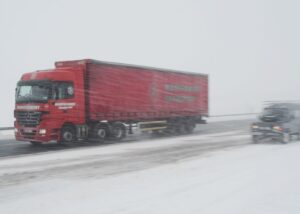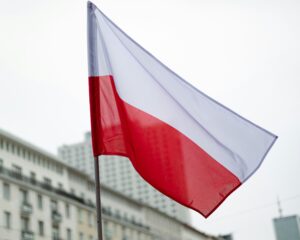
On Monday, NEC Ukrenergo will restrict electricity supply in all regions of Ukraine.
“Tomorrow, January 26, hourly power cuts and power restrictions (for industrial consumers) will be applied in all regions of Ukraine,” Ukrenergo said in a statement on Telegram.
The reason for the restrictive measures is the consequences of Russian missile and drone attacks on energy facilities, the NEC notes.
The press service of NEC Ukrenergo reports that the situation in the energy system may change.

Traffic restrictions for trucks and large vehicles have been introduced on state roads in the Vinnytsia region due to significant weather deterioration, according to the State Agency for Restoration Telegram.
“Restrictions are being imposed … on the following road sections: M-30 Stryi — Uman — Dnipro — Izvarine (via Vinnytsia, Kropyvnytskyi) km 441 — km 417 (from Nemyriv, Vinnytsia region to the border of Cherkasy region); R-33 Vinnytsia — Turbov — Haysyn — Balta — Velyka Mykhailivka — /M-16/ — km 121 — km 170 (from Haysyn to Obodivka village, Haysyn district, Vinnytsia region),” the information says.
The agency reminded that similar measures are in place in Volyn, Zhytomyr, Rivne, and Lviv regions, and this is extremely important to prevent traffic jams, accidents, and congestion at the borders of neighboring regions.
“The resumption of vehicle traffic will be announced separately,” the agency said.

French authorities have completely lifted the travel ban on Telegram founder Pavel Durov and canceled the requirement to regularly report to the police station in Nice, French media reported, citing a judicial source. Earlier in June 2025, the restrictions were eased with permission for short-term trips to Dubai, and now the measures have been completely lifted after “impeccable compliance with judicial control” for a year, Le Monde notes.
Durov was detained in France in August 2024 and placed under judicial control with a bail of €5 million, a ban on leaving the country, and an obligation to report regularly to the police. In the spring and summer of 2025, the court consistently allowed temporary trips to the UAE for up to 14 days. The investigation in France is ongoing and does not constitute an admission of guilt.

The Polish Sejm has passed a law introducing new conditions for foreigners, including Ukrainian citizens, to receive the “Rodzina 800+” child benefit. The law links the payment of benefits to the mandatory employment of parents, as well as to children attending Polish schools. businessinsider.com.pl+2rmf24.pl+2
A foreigner will be entitled to the “800+” benefit only if they were employed in Poland in the previous month. If the parent was not working, the benefit will be suspended. A mandatory condition is that the children of foreigners must attend Polish schools. Foreigners must earn at least 50% of the minimum wage in Poland. In 2025, this is approximately PLN 2,333 gross.
The document must now be signed by Polish President Karol Nawrocki to enter into force. The temporary protection period for Ukrainians has also been extended until March 4, 2026.
According to a report by the Union of Polish Metropolises, in May 2025, approximately 3.37-3.85 million Ukrainians were living in Poland, many of whom had arrived since the start of the war in 2022. According to another source, about 1.55 million Ukrainian citizens live in Poland with documents, with different statuses (temporary residence, work, etc.).
There is also an estimate that before the war and before the active phase of migration began, there were about 1.35 million Ukrainians who were there legally as migrant workers and others.

A debate has erupted in the UK over the Bank of England’s plans to restrict the ownership of stablecoins — cryptocurrencies pegged to the dollar, euro, or other stable assets.
The regulator fears that if people transfer their money from banks to such digital assets en masse, it could hit the banking system. Therefore, a limit is being discussed: for ordinary citizens — no more than £10-20 thousand (approximately $13.6-27.2 thousand), for companies — up to £10 million.
If the decision is adopted, the UK will become one of the strictest countries in regulating stablecoins — stricter than the US and the EU.
Representatives of the crypto industry consider such steps harmful. According to them, the restrictions will reduce the country’s attractiveness to investors; it will be more difficult and expensive for people to use digital currencies; the control system itself will prove to be too complex and costly, as stablecoin issuers do not know who owns their tokens at any given moment.
“The introduction of limits will hit depositors, the City of London, and even the pound,” said Coinbase Vice President Tom Duff Gordon. “No other major country has introduced such measures.”
Supporters of stablecoins emphasize that they could make international transfers faster and cheaper.
The Bank of England responds that the restrictions will be temporary — to give the financial system time to adjust to the new digital money market. “A massive outflow of funds from banks could lead to a reduction in lending to businesses and the public,” explained regulator representative Sasha Mills.
Finance Minister Rachel Reeves has previously stated that the government will support the development of blockchain technologies, including the use of stablecoins.
The global market for these digital currencies is currently estimated at approximately $288 billion.